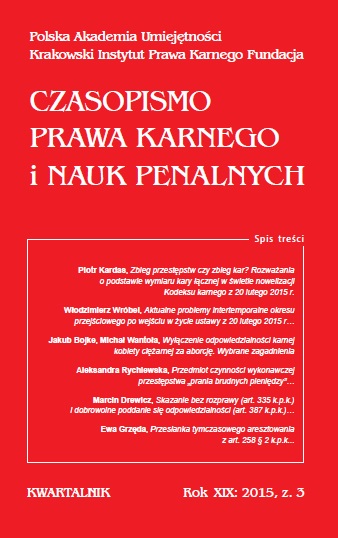Przesłanka tymczasowego aresztowania z art. 258 § 2 k.p.k. Uwagi na marginesie uchwały Sądu Najwyższego z 19 stycznia 2012 r. (I KZP 18/11) oraz nowelizacji Kodeksu postępowania karnego
Condition for applying pre-trial detention from art. 258 § 2 of the Code of Criminal Procedure. Comments on the decision of the Supreme Court (I KZP 18/11) and amendment to Code of Criminal Procedure
Author(s): Ewa GrzędaSubject(s): Criminal Law
Published by: Polska Akademia Umiejętności / Krakowski Instytut Prawa Karnego Fundacja
Keywords: pre-trial detention; amendment to the Code of Criminal Procedure
Summary/Abstract: Niniejszy artykuł dotyczy szczególnej podstawy stosowania tymczasowego aresztowania, jaką jest surowa kara grożąca oskarżonemu (art. 258 § 2 k.p.k.). Analizie zostały poddane obowiązujące przepisy, ze szczególnym uwzględnieniem uchwały Sądu Najwyższego, I KZP 18/11, która w sposób jednoznaczny przyznała tejże podstawie samodzielny charakter. Autorka poddaje krytycznej ocenie szeroko zaaprobowane stanowisko, jakoby okoliczności wskazane w art. 249 § 1, 257 § 1 k.p.k. oraz negatywne przesłanki zawarte w art. 259 § 1 i 2 k.p.k. stanowiły immanentną część regulacji zawartej w art. 258 § 2 k.p.k. Jednocześnie autorka formułuje krytyczne uwagi pod adresem samej instytucji zagrożenia surową karą jako podstawy stosowania tymczasowego aresztowania w kształcie nadanym przez polskie prawo. Artykuł zmierza do uwypuklenia aspektów, które są sporne w obecnym stanie prawnym, ale pozostają kontrowersyjne również w procedurze karnej po 1 lipca 2015 r. na gruncie ustawy nowelizującej Kodeks postępowania karnego. This paper discusses one of the specific conditions for applying pre-trial detention, which is the severity of the penalty that may be imposed on the accused (art. 258 § 2 of the Code of Criminal Procedure). The analysis covers the provisions currently in force, including in particular the decision of the Supreme Court, docket no. I KZP 18/11, which unequivocally recognized the above mentioned condition as a self-sufficient basis for applying pre-trial detention. The author critically analyzes widely approved view, that the conditions specified in art. 249 § 1 and 257 § 1 of the Code of Criminal Procedure as well as negative conditions specified in art. 259 § 1 and 2 of the Code of Criminal Procedure are inherent parts of the regulation of art. 258 § 2 of the Code of Criminal Procedure. The Author also critically addresses the severity of penalty which may be imposed on the accused as a basis for ordering pre-trial detention in the form prescribed by the Polish law. The aim of this paper is to highlight the disputable aspects of these issues on the grounds of the provisions currently in force. However, it seems that they will still remain a controversial issues of the criminal procedure even after July 1st 2015 on the basis of the statute amending the Code of Criminal Procedure.
Journal: Czasopismo Prawa Karnego i Nauk Penalnych
- Issue Year: 19/2015
- Issue No: 3
- Page Range: 137-166
- Page Count: 30
- Language: Polish

